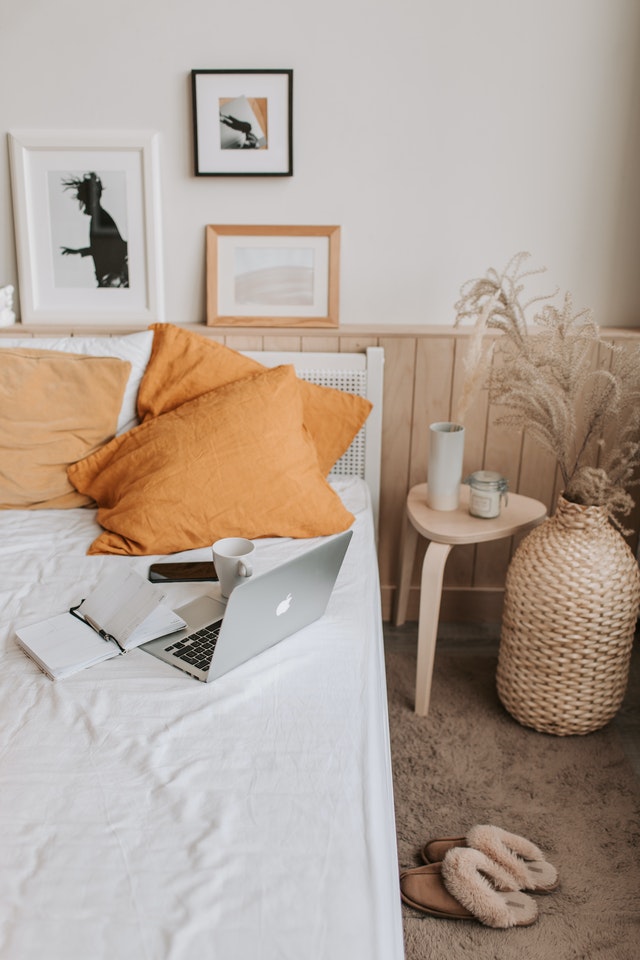Does the appearance of your home impact your mood? It might. Most of us are spending more time at home than ever before as a result of the coronavirus. Research shows that our surroundings impact our mood, which is why it’s important to cultivate a good space at home. Here are some home tips for creating a better mood indoors and making your home a happier place to be.
Consider The Color Scheme
It is true that the colors you paint your walls or the color scheme of your decor depends largely on your preferences, but if you are designing your home to be your happy place or to have a particular vibe to it, you might consider the color scheme based on what you’re going for. It might matter more than you think.
Research conducted on students showed that students who looked at the color red before taking an exam actually got a lower test score in comparison to those who did not, proving that our sights have a greater impact than the average person may believe.
Another study that looked at room colors specifically showed that many people preferred the color blue, which could be because shades of blue are often affiliated with tranquility, peacefulness, or a sense of calm. Colors like white, on the other hand, are often affiliated with purity, whereas yellow can be affiliated with joy.
There is a whole realm of study within the world of psychology called “color psychology” that focuses on how colors impact people, their behavior, and their moods. Choose colors that you like when you decorate your home, but also consider what you envisioned for the mood of your room.
You might choose something attractive and stimulating for your office, something universally appealing for your living room or guest room, and something a little bit more tranquil or calm for your bedroom.
Let The Light In
Part of why some people experience low mood during the Winter or even encounter seasonal affective disorder is that natural light actually has an impact on our mood. It makes sense that if a room is dim, you might be less alert or even feel down because many of us affiliate a dim room with going to bed, or a lack of light with sadness. Keeping your room light and bright and letting the sun and when it shines is shown to boost your mood, so take advantage of natural light when you can.
While it’s less about home decor or keep up and more of a tool that you can use in your home, many people buy special lamps to help with seasonal affective disorder or seasonal depression. Purchasing one of these lamps yourself is an excellent idea if you experience symptoms during the cooler months of the year.
You may also consider mental health counseling so that you have someone to talk to you about seasonal affective disorder, depression, or the standard Winter blues.
Display Something That Makes You Smile
While it may seem obvious that one would have an item that they love in their home, some people do forget to add a piece that’s there just to make them happy. This could mean hanging up photos of loved ones, putting a knick-knack or special possession on display, or just purchasing a wall hanging, candle, or art piece that really screams “you.” Find something that makes you smile every time you see it, and add it to your home. Don’t make it cluttered, but add a personal touch or two that makes you feel joyful and comfortable in your space.
Keep It Tidy
I know. When your mood is low, it can be tough to clean. However, if your home is cluttered or messy, it may create a feedback loop where your home impacts your mood negatively, and your mood is even lower than it would be otherwise, making it even more difficult and stressful to manage. There are ways to navigate this that deviate from the typical advice to “pull up your bootstraps and get it done.” Some ideas for those who struggle with cleaning are to:
- Break it down into smaller pieces (it can be overwhelming to think of cleaning the entire house or apartment at once, so pick one spot or task and focus on that only).
- Prioritize the most urgent task (this could be washing the dishes, taking the garbage out, or doing the laundry).
- Plan ahead (decide that you’ll take care of the living room on a specific day each week, the kitchen on another, and the bathroom on another. That way, you’ll have somewhat of a schedule, and most weeks, cleaning will become routine maintenance).
- Get help from your kids, a friend, a family member, or a partner if you can.
Sometimes, it’s helpful to simply get the clutter out of the way. It’s not ideal, but time crunches happen, and some physical, developmental, and mental health conditions can make it tough to tidy up. It’s crucial to decrease the shame and guilt surrounding this symptom.
If you do struggle with mental health, whether it’s as a result of a diagnosis or not, it’s important to reach out for support from a licensed mental health provider. Depression is hard to live with, and while treatment varies from person to person, it’s a condition that can improve substantially when you find the mental health care option that works the best for you. You don’t have to go through this alone, and support is out there.
Counseling
Despite the fact that the appearance of your home, whether it’s related to color, cleanliness, or light, can have somewhat of an impact on your mood, it is not the thing to blame if you experience a mental health condition. In fact, there’s nothing to blame or feel ashamed about.
Mental health conditions such as depression and anxiety are very common, and anyone experiencing a mental health condition of any kind deserves care that works. Even if you’re simply going through a hard time, want someone to talk to, are experiencing a high level of stress, or are going through issues within your relationships or work life, counseling can benefit you.
Look for a counselor in your local area or use an online therapy website like BetterHelp. BetterHelp’s counselors are licensed, and everyone who joins will get a custom match who fits their needs. Download the BetterHelp app on the Google Play Store or head to the BetterHelp website to get started.
Photo by Vlada Karpovich from Pexels

Marie Miguel has been a writing and research expert for nearly a decade, covering a variety of health- related topics. Currently, she is contributing to the expansion and growth of a free online mental health resource with BetterHelp.com. With an interest and dedication to addressing stigmas associated with mental health, she continues to specifically target subjects related to anxiety and depression.


